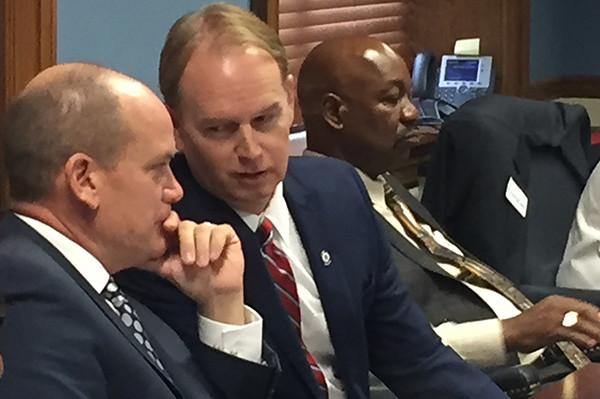Big trees grow from small acorns and, in the case of Guilford County’s mental health services, a very big deal reached between Guilford County, Cone Health and Sandhills Center came from a short but forceful statement made by one commissioner in early 2017.
At that time, Commissioner Jeff Phillips was chairman of the Board of Commissioners, and he – depending on one’s choice of metaphors – threw down the gauntlet, put his foot down or drew a line in the sand.
At the commissioners annual retreat, at the Cameron Campus of Guilford Technical Community College in Colfax, the commissioners were discussing mental health services and voicing the wide range of complaints they had been hearing for a long time. The discussion was at first tepid but then Phillips said his piece.
He said at that meeting, with intensity, that the board needed to finally take a serious look at the way mental health services are provided.
“We’ve not done that since I’ve been on the board and I think it’s critical that we do so,” Phillips said at that meeting in February 2017. “Right or wrong, this has been kind of put on the back burner, and I think we ought to bring it forward.”
He added, “We’ve got to take an objective, diligent role with regard to how mental health services are being provided in Guilford County. For a long time we’ve trusted that the way it is is the best that we can do, and I’m not satisfied with that any longer.”
Not long after that, Phillips formed a working group of commissioners as well as others to look into the issue and, as the talks evolved, Cone and Sandhills joined in – and, ultimately, the three came together to usher in a new model of mental health care the county.
Phillips said this week that he remembers the complaints he and other board members were hearing. He also said he was getting “a lot of constructive feedback from key mental health services providers in the community,” and he added that the lack of communication and the way work was being done in “silos” gave him real pause.
“That was kind of the first formal statement I made as a commitment to Guilford County,” Phillips said of the moment at the retreat. “To me, I thought that would be an opportunity to clear the air a little bit.”
“There were a lot of excuses,” he said. “Blame it on the state, blame it on changed services, blame it on this.”
Phillips said he certainly did not then, and does not now, want to be critical of people who were doing their best in a very difficult field, but he added that what the county was doing then clearly wasn’t working.
He said the view forward meant bearing down, doing research and gaining a better understanding of the landscape. Phillips, who in his life has seen first-hand the damage that mental illness and substance abuse can bring, said he had studied a little bit of behavioral science in college and added that he found the subject “fascinating.”
“For a person experiencing poor mental health, it is something that permeates every single facet of their lives to their detriment of their families and often times obviously their community. And that is incredibly motivating to me.”
Phillips said he felt like the Lord had placed him in the position he was in at that time to help address that issue.
He said he also knew it would take all hands on deck approach.
“None of this can be done well with one individual; I recognized that,” he said.
After Phillips formed the working group to study the situation things started falling in place. Former Commissioner Ray Trapp was a constant advocate for mental health care reform before he left the board in May 2017 to take a job with North Carolina A&T State University. Commissioner Alan Perdue, also in the group, had been director of Guilford County Emergency Services and Commissioner Kay Cashion had a great deal of experience in the field.
It took long time but commissioners and others are excited about what is finally happening.

